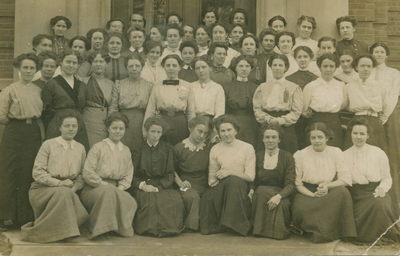Canada: Diakonia of the United Church of Canada (DUCC)
Here’s a link to the website.
Brief history here,
Brief history
(Source: http://uccdeaconesshistory.ca/history-and-historic-documents/overview/)
Canadian Methodists designated the first Deaconesses in 1897, the Presbyterians in 1908. In 1926, 101 women from the two denominations joined the new United Church of Canada’s Deaconess Order. The Order provided a pathway for women to obtain a theological education and the training to carry out a variety of social, educational and liturgical ministries. The women did amazing and important work, in Canada and abroad. Deaconesses in the United Church helped Canada shape its commitment to providing universal social support and education, and to take its place on the world stage. They responded to the call of God by giving of themselves, and by making the most of the opportunities the church provided for their ministry. Their contribution wove a richness into the fabric of the United Church. Over 600 women served as Deaconesses, their influence was significant.
Diaconal Education There are currently two schools offering diaconal education for the United Church of Canada.
Diakonia of The United Church of Canada Statement of Vision
(PDF version here)
God calls us to diaconal ministry.
The gospel of Jesus invites all to this ministry:
to offer compassion and accompaniment.
to work for liberation and justice,
to act as advocates of creative transformation.
Diaconal ministry, as a recognized order, is rooted
within our faith tradition and history,
and it is continued and embodied
in an ecumenical, world-wide community.
This vocation is a journey
involving Spirit-filled enrichment and learning,
requiring humble offering of self,
demanding prayerful discernment and courageous risking,
exercising visionary and communal leadership,
promising joy and meaning,
and daring to imagine God’s abundance
in a world of love and respect.
Through education, service, social justice, and pastoral care,
diaconal ministry in The United Church of Canada,
encourages a growing faith,
speaks truth to power,
seeks mutual empowerment,
proclaims prophetic hope,
nurtures life-giving community,
fosters peaceful, right relationship,
within the church and the whole of creation
wherever the Spirit may lead.
Adopted at DUCC National Gathering, April 2009.
Information to be collected includes (but is not limited to) the following questions.
A brief history (may include links to documents and websites) – how did it all get started? What are the key dates and events? Are there documents that are part of the history (please specify)?
Denomination/church/agency/institution of which diaconal ministry agents are a part?
Diaconal ministry agents: consecretrated/commissioned/ordained/other?
Title: Sister, Deaconess, Deacon, Rev, etc
Historical information and dates re formation/recognition of diaconal ministry agents in the denomination/church agency.
Does the diaconal ministry agent wear a distinctive uniform? Are diaconal ministry agents able to be married? Are they remunerated? Do they live in community (eg motherhouse) or independently? Etc.
What kind of training/formation do diaconal ministry agents receive before formal recognition in their church. Are there expectations of ongoing training, or professional development? If yes, what is expected and how often does it happen?
How many diaconal ministry agents are there currently in the denomination or church agency? Any comment on trends in numbers?
Are there key people (historical or current) in the organization who have provided significant leadership. Any weblinks to their story, or a short write up?
Who are the current leaders in the diaconal association? (photos, ‘blurb’).
Relationship of diaconal ministry agents to a denomination/church agency
An overview of main responsibilities for diaconal ministry agents (past and present). Are they located within a church, a particular facility or agency, or community based? Are diaconal ministry agents appointed to individual placements or work together on projects or in institutions?
Are diaconal ministry agents able to preside at sacraments (communion, baptism, weddings etc)?
Who makes the appointments for diaconal ministry agents eg they apply for positions, they are appointed (eg by a Bishop, by the conference office, or another body/committee).
Is there a length of time for appointments (eg usually less than 5 years, usually between 5 and 10 years, at the discretion of the diaconal ministry agent or at the discretion of the appointing body), appointed to and remain with a particular mother house, etc.
Do diaconal ministry agents organize conferences, seminars, gatherings for professional development, pastoral peer support etc? How often and what is the nature of these events?
Key issues and challenges in the contemporary ministry context
Do the diaconal ministry agents have ‘code of conduct’ or ‘code of ethics’ that inform ethical and behavioral expectations for ministry?
Key documents (historical, vision and mission etc) – links or PDF or Word files
Photos
Links to relevant articles, websites etc
Other areas of interest……
(information to Rev Sandy Boyce, President, DIAKONIA World Federation, sandyeboyce@gmail.com, to upload to this website)

